Thinking about a fresh start in a vibrant, diverse country? Brazil offers a unique mix of natural beauty, economic opportunities, and rich culture. With over 8.5 million square miles of beaches, jungles, and bustling cities, it’s a place where adventure meets modern living.
The country welcomes 1.3 million immigrants, blending European, African, Japanese, and indigenous influences. From São Paulo’s fast-paced lifestyle to Rio’s coastal charm, each city has its own rhythm. Plus, living costs are 40% lower than in many Western nations.
Whether you’re drawn to Florianopolis’ digital nomad scene or Salvador’s UNESCO-listed Pelourinho district, there’s something for everyone. Healthcare improvements and an 87.6% vaccination rate add to the appeal. Ready to explore?
Key Takeaways
- Brazil’s cost of living is significantly lower than in Western countries.
- The country blends diverse cultural influences, creating a vibrant lifestyle.
- São Paulo and Rio de Janeiro are top hubs for professionals and expats.
- Florianopolis is gaining popularity among digital nomads.
- Public health infrastructure has strengthened, with high vaccination rates.
Why Brazil is a Top Destination for Expats
With its breathtaking landscapes and lively traditions, this South American gem draws people from around the world. The mix of vibrant culture and economic potential makes it a standout choice for those seeking change.
Cultural Richness and Natural Wonders
Carnival isn’t just a party—it’s a cultural phenomenon. This event showcases Brazil’s creativity through samba parades, elaborate costumes, and infectious energy. Beyond festivals, the Amazon rainforest spans 60% of the country, offering unmatched biodiversity.
Coastal cities like Rio de Janeiro boast over 2,000 beaches. Warm winters average 25°C (77°F), perfect for year-round outdoor activities. In contrast, southern cities like Porto Alegre offer cooler subtropical climates.
Thriving Economy and Work-Life Balance
Earning potential here is strong, with an average monthly salary of 8,600 BRL (~$1,700). Key industries include:
- Tech: Campinas has growing IT hubs with living costs around $780/month
- Energy: Macaé serves as Brazil’s oil industry capital
- Remote work: Digital nomad visas require just $1,500/month income
Life expectancy has jumped 22 years since 1960, now reaching 76. São Paulo’s Liberdade district exemplifies cultural fusion, home to the largest Japanese diaspora outside Japan.
“Moving here improved my quality life dramatically. The pace is slower, but productivity feels higher,” shares a software developer from California.
While bureaucracy exists (called “Brazil Cost”), the tradeoffs—lower expenses, tropical climate, and welcoming locals—often outweigh the challenges.
Top Cities for Expats in Brazil
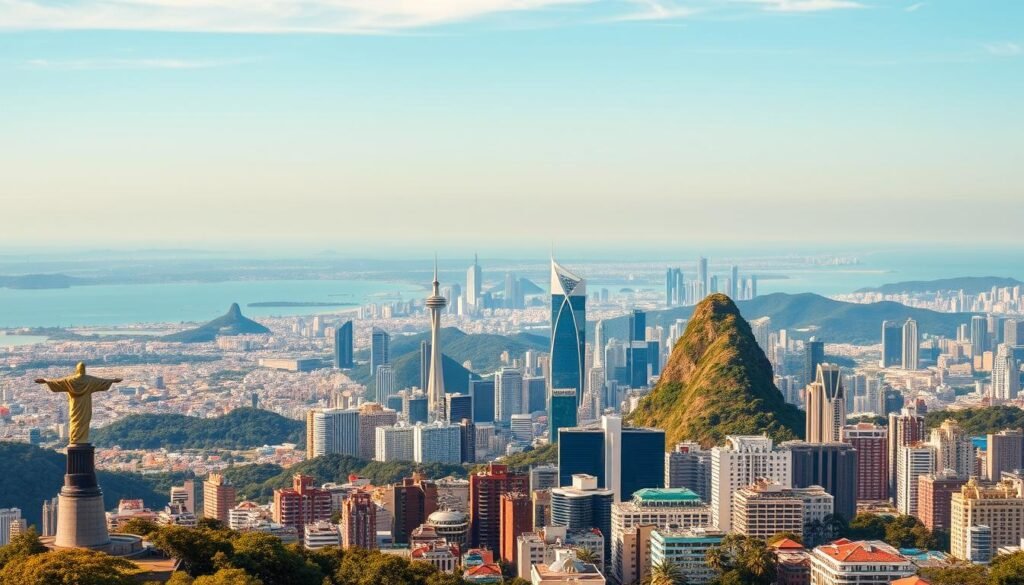
From financial powerhouses to beachside retreats, these destinations cater to every preference. Whether you seek career growth or a relaxed coastal vibe, Brazil’s urban hubs deliver.
São Paulo: The Financial and Cultural Hub
São Paulo drives 34% of Brazil’s GDP, making it the country’s economic heartbeat. Rent here is 25% lower than in New York City, with vibrant districts like Vila Madalena attracting creatives.
Traffic can be intense—average commutes span 45km daily. But world-class museums, 12,000 restaurants, and a thriving startup scene offset the hustle.
Rio de Janeiro: Beaches and Bustling City Life
Rio de Janeiro blends beaches with urban energy. Iconic Copacabana offers golden sands, while Barra da Tijuca provides quieter, upscale living. Safety varies: Ipanema is tourist-friendly; Rocinha favela requires caution.
“Leblon’s cafes and sunset views make it feel like a permanent vacation,” says a tech consultant from Miami.
Florianopolis: A Paradise for Digital Nomads
With 60 beaches and a $808/month cost of living, Florianopolis lures digital nomads. Its 56/100 livability score reflects reliable internet, outdoor activities, and a laid-back vibe.
Salvador: Rich History and Affordable Living
Salvador’s Pelourinho district, a UNESCO World Heritage site, dazzles with colonial architecture. At $825/month, it’s a budget-friendly coastal gem. Carnival here rivals Rio’s, with Afro-Brazilian rhythms setting the tone.
Understanding the Cost of Living in Brazil
Managing your budget in Brazil is easier than you might think. From rent to groceries, daily expenses are significantly lower than in the U.S. or Europe. A single person spends about 2,526 BRL/month ($500) excluding rent—half the cost of many Western cities.
Brazil vs. the USA: Expense Breakdown
Rent is where you’ll save the most. A one-bedroom apartment in São Paulo’s city center costs $286/month, compared to $1,679 in New York. Even electronics, which carry a 25% premium, balance out with cheaper options like local Android phones.
| Expense | Brazil (USD) | USA (USD) |
|---|---|---|
| 1L Milk | 1.22 | 3.50 |
| Gym Membership | 30 | 60 |
| Dinner for Two | 25 | 60 |
Smart Budgeting Strategies
Farmers’ markets (feiras livres) slash grocery bills by 30% versus supermarkets. For rentals, negotiate long-term leases—landlords often discount rates for 12+ month contracts.
“I cut my food budget by shopping at weekly markets. Fresh produce costs pennies here,” shares a teacher from Texas.
- Tax hack: Digital nomads pay 0% income tax under the new visa.
- Utilities: Average $150/month for an 85m² apartment.
- Banking: Use Wise for low-fee BRL/GBP transfers at 6.42 rate.
Healthcare for Expats in Brazil
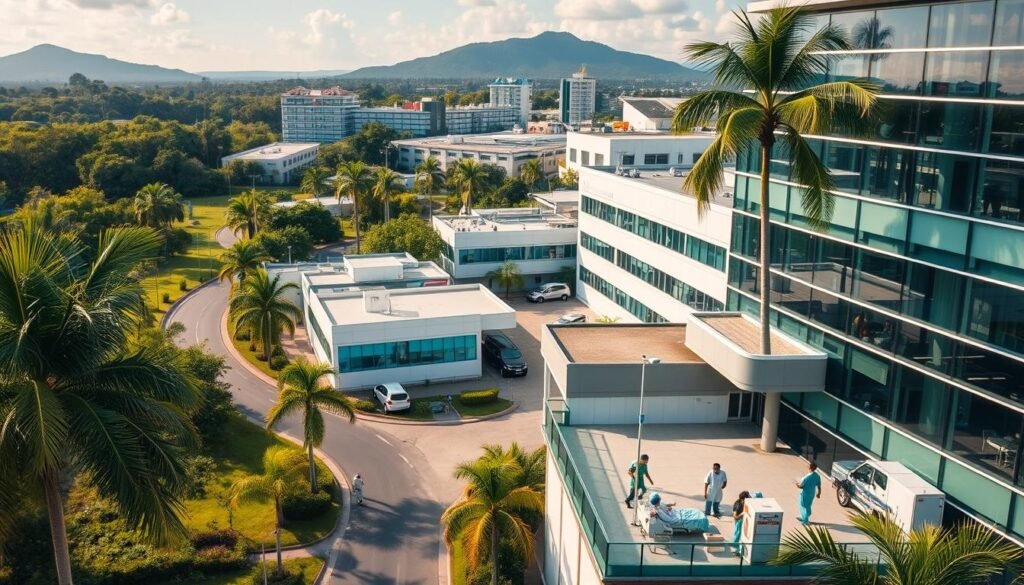
Navigating healthcare abroad can be complex, but Brazil offers solid options for residents. The country blends a free public system with high-end private healthcare, catering to different budgets and needs. Whether you’re staying short-term or settling long-term, understanding these choices ensures you’re covered.
Public vs. Private Healthcare Options
Brazil’s public healthcare system (SUS) serves 75% of the population, including emergencies and basic treatments. However, wait times for specialists can exceed six months. Key notes:
- Free access: SUS covers hospital stays, vaccinations, and some medications.
- Limitations: Rural areas face shortages; urban clinics may be overcrowded.
Private hospitals like São Paulo’s Albert Einstein rival top global facilities. A consultation costs ~$100, but procedures are 30–50% cheaper than in the U.S.
Navigating Health Insurance as an Expat
Most foreigners opt for health insurance to bypass SUS delays. Family plans range from $200–500/month. Consider:
- International plans: Cigna or Allianz cover 100% of costs, including evacuation.
- Local providers: Amil offers cheaper regional coverage.
“My Allianz plan saved me $12,000 on a surgery. Claims were processed in days,” shares a consultant from Chicago.
Other essentials:
- Dental care: Cleanings cost $20 (half U.S. prices).
- Pharmacies: Droga Raia and Pacheco dominate, with generics up to 70% cheaper.
- Emergencies: Dial 192 (SAMU) for ambulances or 193 for fires.
In northern states, Zika and dengue are risks—use repellent and screened windows. São Paulo’s air pollution (20 µg/m³) exceeds WHO limits, so mask up in heavy traffic.
Finding Accommodation in Brazil
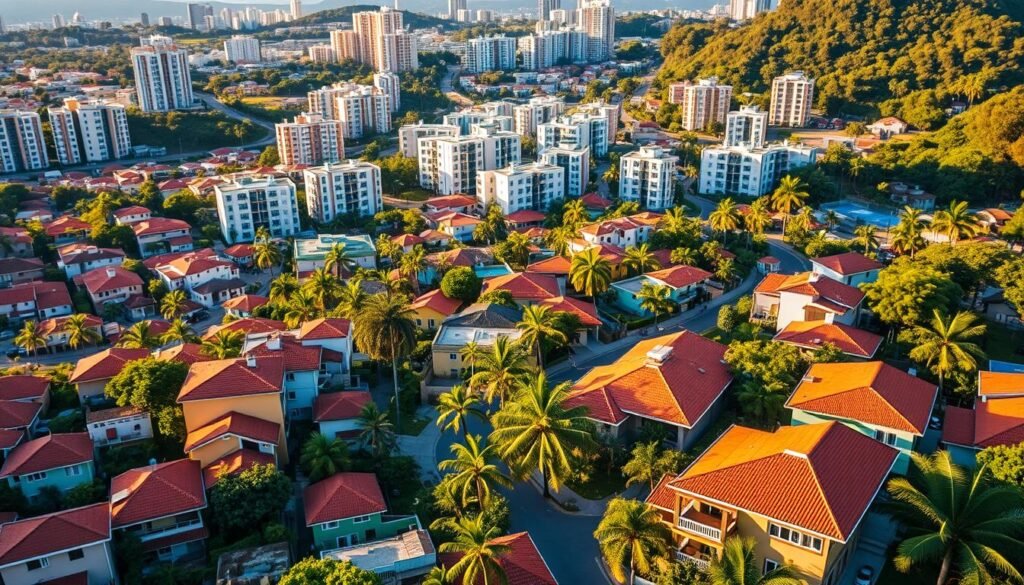
Brazil’s housing market offers diverse options for every lifestyle. Whether you prefer urban energy or coastal serenity, understanding local norms helps you secure the perfect home.
Renting vs. Buying Property
Most newcomers rent first. Standard leases run 30 months with a one-month deposit—73% cheaper than the UK. Websites like QuintoAndar and Zap Imóveis list verified properties.
Buying involves extra costs:
- Taxes: 3% ITBI transfer tax + 2% registry fees.
- Restrictions: Foreigners can’t own land within 100m of coasts.
- Furnished vs. unfurnished: Unfurnished saves 20% monthly.
“I rented in São Paulo for two years before buying. It gave me time to learn the areas,” says a German entrepreneur.
Best Neighborhoods for Expats
Each city has standout districts:
- Alphaville (São Paulo): Gated community with 24/7 security and pools.
- Santa Teresa (Rio): Historic charm, but renovation costs add 15%.
- Blumenau: Avoid flood-prone zones; check municipal maps.
Condos often charge $200–800/month for amenities like gyms and concierge services. Always inspect properties in person—photos can hide issues.
Education Options for Expat Families
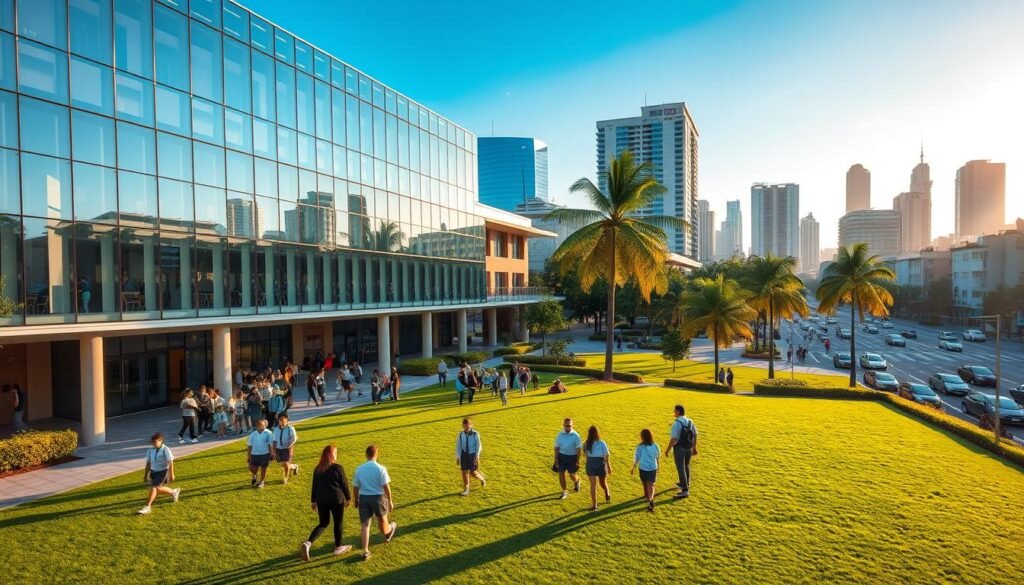
Choosing the right school for your family is a top priority when relocating. Brazil provides a mix of international schools and local institutions, each with unique benefits. Whether you seek globally recognized curricula or cultural immersion, options abound.
International Schools in Major Cities
These schools cater to diverse student bodies, offering programs like the International Baccalaureate (IB). São Paulo alone hosts 25 IB schools, including Graded School, with annual fees around $30K. Key advantages:
- Language support: Many offer ESL and Portuguese immersion programs.
- Special needs: Tailored resources are more common than in public schools.
- Extracurriculars: Activities range from robotics to capoeira, often included in tuition.
Brazil’s Education System Explained
The system mandates schooling for ages 6–14, with optional secondary education. Public schools face overcrowding, but private alternatives thrive. Highlights:
- Academic calendar: Runs February–November, aligning with Southern Hemisphere seasons.
- Higher ed: Universidade de São Paulo (USP) ranks #1 in Latin America.
- ENEM exam: Crucial for university admissions; prep courses cost ~$200/month.
“Our kids adapted quickly thanks to their school’s dual-language program,” shares a parent from Toronto.
Homeschooling remains legally gray, while preschools like Escola Parque blend Portuguese and English. PTAs are active, often organizing cultural exchanges.
Safety Tips for Expats in Brazil
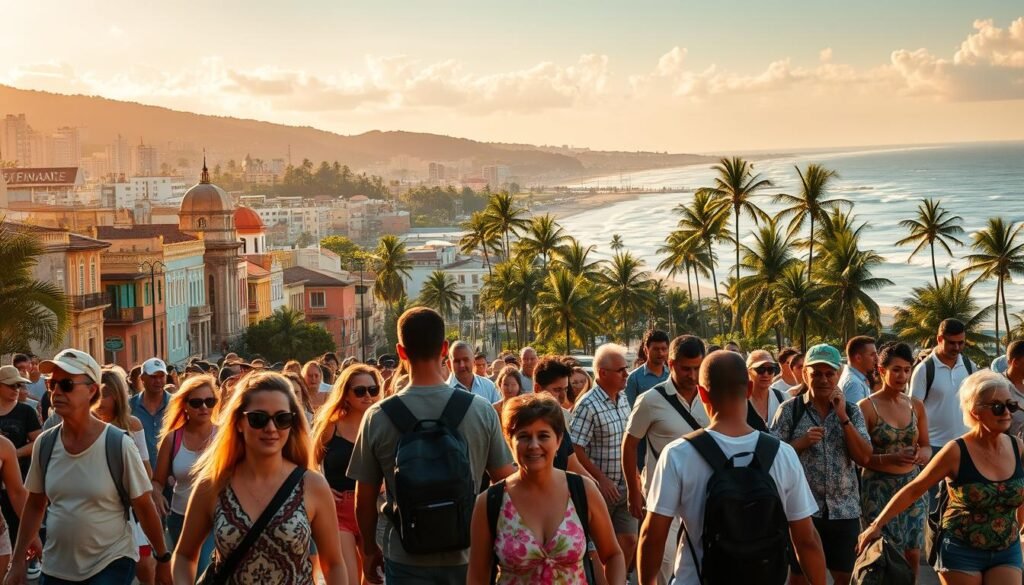
Staying safe while enjoying Brazil’s vibrant culture requires awareness and smart habits. While 56% of newcomers rate safety negatively, most risks are manageable with preparation. From crowded metro stations to beachside relaxation, knowing what to avoid ensures peace of mind.
Common Safety Concerns and How to Avoid Them
Theft is the top issue, especially in tourist-heavy areas like Rio’s Saara market or São Paulo’s Sé metro. Keep phones hidden and wallets in front pockets. For cars:
- Roll windows up at stops to prevent smash-and-grabs.
- Avoid displaying valuables—even sunglasses can attract attention.
Scams targeting digital payments like PIX are rising. Verify recipients’ details before transferring funds. Apps like SOS Cidadão connect you to police with one tap.
Neighborhoods and Situations to Approach Carefully
Favelas offer cultural richness but require local guides. LGBTQ+ travelers find safe spaces in São Paulo’s Frei Caneca district. After dark, stick to well-lit streets like those near Credicard Hall’s marked exits.
| City | High-Risk Zone | Safety Alternative |
|---|---|---|
| Rio de Janeiro | Copacabana after midnight | Leblon’s patrolled beaches |
| São Paulo | Brás subway at rush hour | Paulista Ave. on weekends |
“Using the community app Nina helped me feel secure walking home. Locals share real-time alerts about unsafe spots.”
Beachgoers should leave passports in hotel safes—bring only cash and a copy of your ID. Military police handle emergencies (dial 190), while civil police investigate crimes after the fact.
Visa Requirements for Moving to Brazil

Brazil offers multiple visa pathways tailored to different needs and goals. Whether you plan to work, retire, or explore as a digital nomad, understanding the options ensures a smooth transition. Requirements vary by visa type, but all applications demand careful preparation.
Types of Visas Available
Choose the right category based on your purpose:
- Digital Nomad Visa: Requires proof of $1,500/month income and valid for two years.
- Retirement Visa: Needs $2,000/month passive income and health insurance.
- Investor Visa: Minimum 150K BRL investment in local businesses.
- Marriage Visa: Processes in six months but requires notarized documents (~200 BRL each).
Mercosur citizens (e.g., Argentinians) enjoy faster approvals. Tourist visas can sometimes convert to work visas, but overstays incur fines of 8.28 BRL/day.
How to Apply for a Brazilian Visa
Start by gathering:
- Police clearance certificates (translated if not in Portuguese).
- Proof of health coverage (private insurance is mandatory).
- CPF number—essential for banking and rentals.
“The consulate interview was straightforward once I had all my documents notarized,”
E-Visas process in 24–72 hours for eligible nationals. Work visas (VITEM V) take 4–9 months and require a job offer. Always check the latest rules—Brazil’s policies evolve frequently.
Building Your Social Life in Brazil
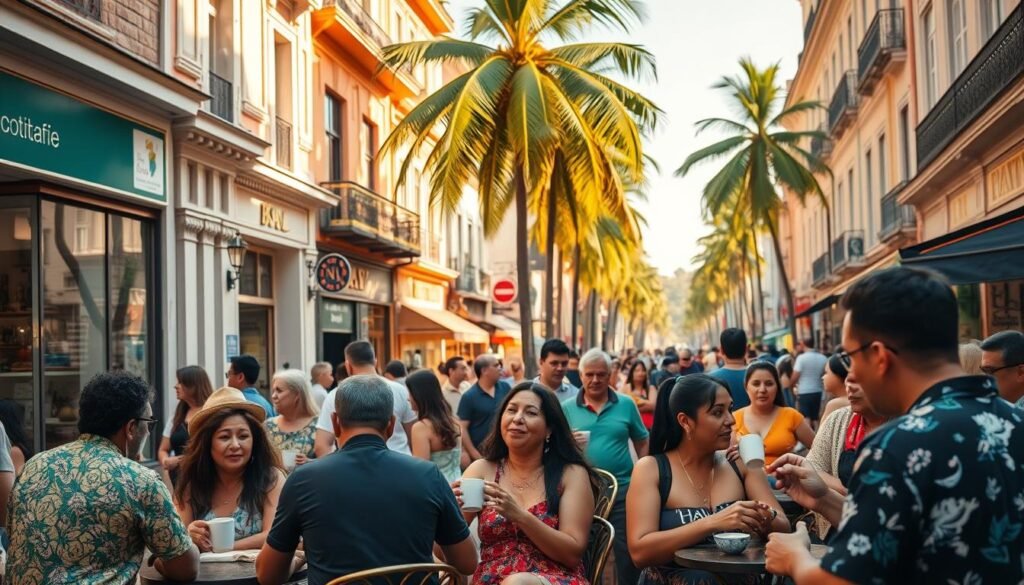
Building a vibrant social circle in Brazil opens doors to unforgettable experiences. Whether you’re new to the country or looking to expand your network, blending into the local scene is easier than you think. From lively festivals to professional mixers, there’s something for everyone.
Finding Your Tribe
Start by joining groups like InterNations, active in 12 cities. Facebook hosts 150+ groups for foreigners, from “Americans in São Paulo” to niche hobby clubs. Key ways to connect:
- Meetups: Terraço Itália in São Paulo hosts monthly mixers with skyline views.
- Hobbies: Rio Hiking Club organizes treks to Tijuca Forest.
- Volunteer: NGOs like TETO build homes in underserved areas.
Events That Bring People Together
Brazilians love celebrations. The Parintins Folkloric Festival showcases Amazonian legends with elaborate costumes. For professionals, Amcham’s networking breakfasts link you to industry leaders.
“I met my closest friends at a language exchange. Brazilians are incredibly welcoming when you show interest in their culture.”
Other opportunities:
- Coworking spaces: WeWork locations often host skill-sharing workshops.
- Sports Learn Flamengo soccer chants to bond with locals.
- Dating apps: Tinder Gold helps filter matches by language.
Working in Brazil as an Expat
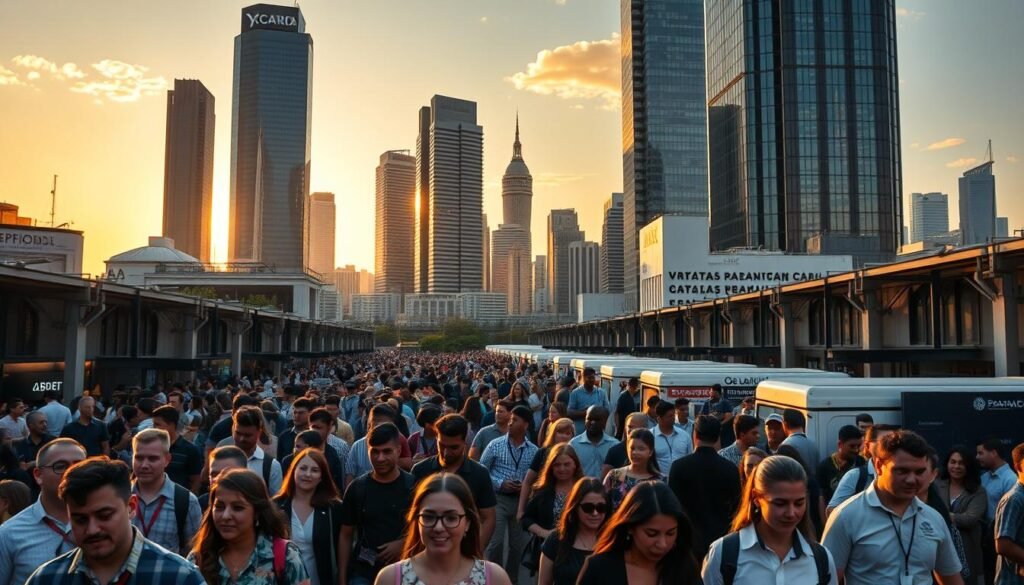
Brazil’s growing economy creates exciting career paths for global professionals. Whether you’re seeking corporate roles or remote work, understanding local norms helps you thrive. Salaries here are competitive, with tech jobs averaging $38K/year.
Job Market Overview for Foreigners
Brazil requires companies to hire 2/3 local staff, but niche sectors welcome international talent. Top fields include:
- Agritech: São Paulo’s startups need data analysts and engineers.
- Fintech: Nubank and PicPay hire bilingual developers.
Portuguese fluency boosts opportunities. Recife’s Porto Digital tech hub offers roles in AI and cybersecurity. Optimize your LinkedIn profile with Portuguese keywords to attract recruiters.
| Role | Avg Salary (USD) | Key Skill |
|---|---|---|
| Software Developer | 42,000 | Python/Java |
| Marketing Manager | 35,000 | Portuguese + English |
Freelancing and Digital Nomad Opportunities
The Digital Nomad Visa (VITEM XIV) requires proof of $1,500/month income. Freelancers can register as MEI (microentrepreneur) for tax benefits. Platforms like 99Freelas connect freelancers with local clients.
“I bill $120/hour for IT consulting. Brazil’s lower costs let me save 40% more than in Europe.”
Key considerations:
- Nota Fiscal: Issue invoices for all payments to avoid fines.
- Taxes: Remote workers pay 0% income tax under the nomad visa.
- Coworking: Spaces like Selina offer visa partnerships.
Navigating Brazilian Culture
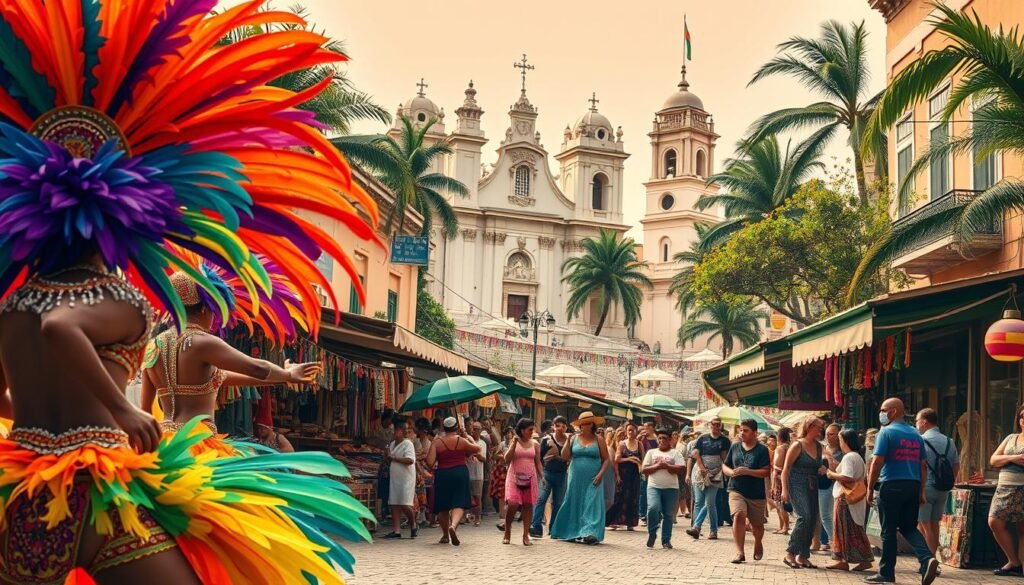
Brazil’s rich traditions and social customs create a vibrant tapestry for newcomers to explore. With 65% of the population identifying as Catholic and warm greetings being the norm, understanding these nuances helps you connect deeper with locals. Whether you’re attending Carnival or simply making friends, cultural awareness opens doors.
Essential Social Etiquette
Time operates differently here—”Brazilian minutes” mean arriving 15-30 minutes late is socially acceptable. When invited to homes, bring small gifts like chocolates or wine. Hosts appreciate the gesture, even if they insist you don’t need to.
Physical contact is common. About 30% of greetings involve hugs or cheek kisses, even in professional settings. Maintain eye contact and smile—it shows respect and openness.
Language Tips for Daily Life
While English works in business districts, basic Portuguese goes far. Start with these essentials:
- “Legal” (cool/nice) – Use to show appreciation
- “Saudade” – The unique feeling of missing someone/something
- “Fique à vontade” – “Make yourself at home”
Regional dialects vary significantly. In Rio, “tu” is common for “you,” while São Paulo prefers “você.” Language exchange meetups help practice while making friends.
“Learning to say ‘tudo bem?’ properly changed how locals interacted with me. Suddenly, shopkeepers became chatty neighbors.”
In business settings, exchange cards formally with both hands. Compliments often get downplayed—respond with “obrigado/a” rather than deflecting praise. Follow up invitations promptly, as Brazilians value enthusiastic responses.
Transportation and Getting Around
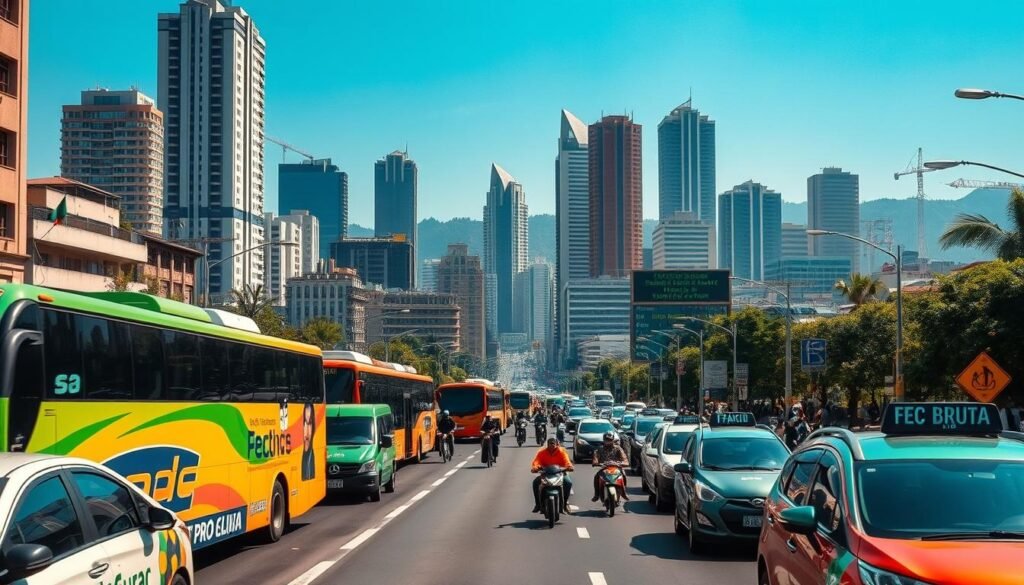
Brazil’s transport system blends modern conveniences with local quirks. Whether you’re zipping through urban areas or exploring coastal routes, options abound. Costs and efficiency vary widely—planning ahead saves time and money.
Public Transport vs. Owning a Car
In city centers, metros and buses dominate. São Paulo’s 5-line network connects key districts, while Curitiba’s bus rapid transit moves 2.3 million daily. Ride apps like 99 (local) often undercut Uber by 15%.
Car ownership has downsides:
- 150% import tax makes foreign vehicles prohibitively expensive
- Fuel averages 6 BRL/liter (~$1.20)
- Zona Azul app manages paid parking in 12 cities
“I sold my car after realizing metro + Uber cost me 40% less monthly.”
Tips for Driving in Brazil
If you drive, note these quirks:
- Convert licenses via Detran—requires a written test for most foreigners
- Motorcycles filter through traffic legally (lane splitting)
- Via Dutra highway tolls cost ~50 BRL between SP and Rio
MAPFRE roadside assistance covers 90% of the country. For rentals, Fiat Strada trucks handle rough roads best. Always check tires—potholes are common.
Expat Communities in Brazil
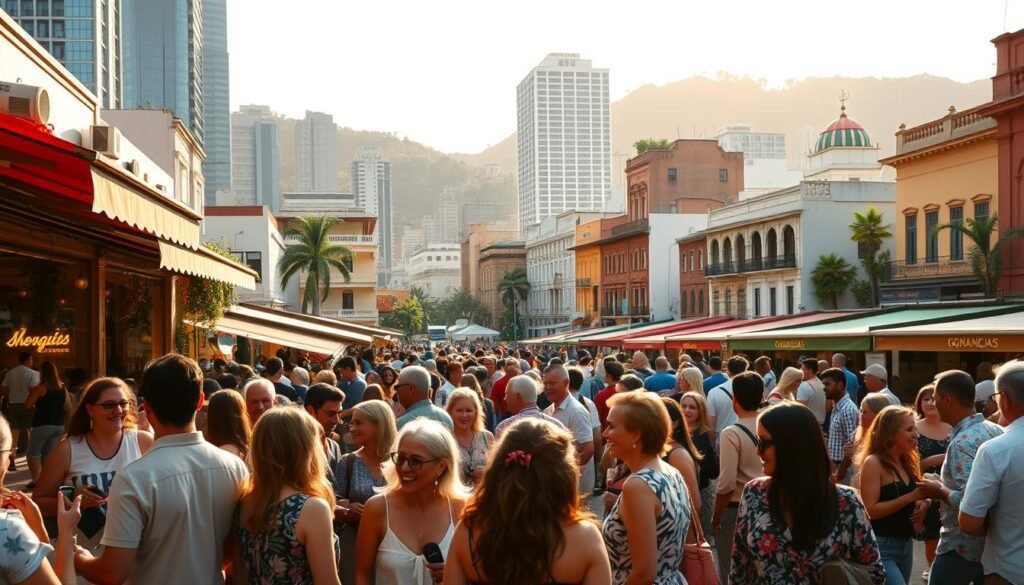
Moving to a new country can feel isolating, but Brazil makes it easy to find your tribe. With over 1.3 million foreigners calling it home, you’ll discover welcoming groups across major cities. From professional networks to hobby clubs, these connections help you settle in faster.
Local Hotspots for Meeting New People
Certain neighborhoods and venues cater specifically to international residents. In São Paulo, the American Society hosts monthly mixers with 34K members. Rio’s The Blue Pub serves as a hub for English speakers, while Florianopolis has beach cleanups organized by expat volunteers.
Key places to start:
- Union Church: Interdenominational services in 5 languages
- Harvard Club BR: Alumni networking with 800+ members
- BabySitterSP: Trusted childcare referrals from other parents
Digital Platforms That Bring People Together
Online forums bridge the gap before you arrive. The Expats Rio Facebook group answers questions about visas and rentals. InterNations lists verified events in 12 Brazilian cities, from wine tastings to startup pitch nights.
| Resource | Focus Area | Membership |
|---|---|---|
| Gringo-Rio Newsletter | Local deals & safety tips | Free |
| MultiLingo Meetup | Language exchange | 9,000+ |
| SP Flatmates | Shared housing | Private group |
“The entrepreneurship meetups introduced me to my first Brazilian clients. Now 60% of my business comes through these connections.”
For urgent needs, crisis support networks operate in English and Portuguese. Always check event details—many gatherings require RSVPs due to limited space.
Leisure and Recreation in Brazil
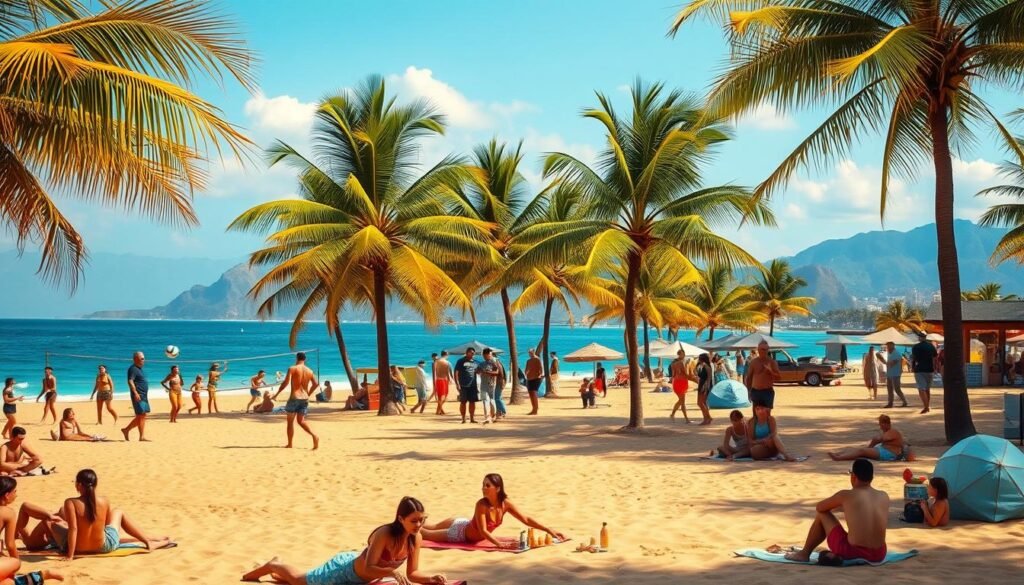
Brazil’s leisure scene blends thrilling adventures with rich cultural experiences. With 8,500km of coastline and 60 national parks, your options range from jungle treks to sophisticated urban entertainment.
Outdoor Adventures Across Diverse Landscapes
The Amazon rainforest offers canopy tours where you’ll spot scarlet macaws and howler monkeys. For water lovers, Fernando de Noronha’s crystal-clear waters host sea turtles and reef sharks perfect for diving.
Adrenaline seekers can try:
- Rock climbing in Chapada Diamantina’s quartz valleys
- Surfing championship waves at Praia do Rosa
- Zip-lining through Atlantic Forest in Bonito
Cultural Experiences That Come Alive
Minas Gerais’ cheese route introduces artisanal queijo minas, while Vale dos Vinhedos serves award-winning sparkling wines. Don’t miss:
- June’s São João festivals with square dancing and corn-based treats
- 20 BRL museum passes in São Paulo covering 5 venues
- Pelourinho’s capoeira circles in Salvador
Nightlife That Never Sleeps
São Paulo’s city center transforms after dark with options ranging from samba clubs to world-class cocktail bars. The Week SP draws LGBTQ+ crowds with drag shows and electronic beats.
Coastal hotspots like Búzios offer beachfront lounges with caipirinhas made from fresh fruit. Live music venues in Rio’s Lapa district keep the party going until sunrise.
| Region | Top Activity | Best Season |
|---|---|---|
| Nordeste | Dune buggy rides (Jericoacoara) | July-October |
| Sul | Thermal baths (Poços de Caldas) | April-September |
| Centro-Oeste | Pantanal wildlife safaris | May-October |
“Paraty’s blend of colonial architecture and emerald waters made me extend my trip twice. I still dream about those boat tours through the islands.”
From Copacabana’s iconic beaches to Ouro Preto’s baroque churches, every corner offers new ways to play and explore. The hardest part? Choosing what to do first.
Challenges of Living in Brazil as an Expat

Adapting to life abroad comes with unique hurdles, and Brazil is no exception. While the country offers warmth and vibrancy, newcomers often face bureaucratic mazes, safety concerns, and cultural learning curves. With 59% of expats citing crime as a top worry, preparation is key.
Common Frustrations and How to Overcome Them
Bureaucracy tests patience. From visa processing (5–30 days) to bank accounts, expect paperwork delays. Locals use jeitinho—creative workarounds—like hiring students to navigate systems. Pro tip: Always carry spare documents.
Language barriers frustrate 80% of arrivals. Portuguese slang varies by region; Rio’s carioca accent baffles even fluent speakers. Free apps like Duolingo help, but immersion accelerates learning.
| Issue | Region | Solution |
|---|---|---|
| Power outages | North | Solar chargers + local grid maps |
| Healthcare waits | Public clinics | Private insurance (avg. $200/month) |
| Import taxes | Nationwide | Shop local brands (e.g., Havaianas) |
Adjusting to the Pace of Life
Brazil runs on “elastic time.” Meetings start late, and replies take years—or feel like it. Embrace it: Cafés with Wi-Fi let you multitask while waiting.
“After six months, I stopped stressing over punctuality. Now I bring a book everywhere—it’s liberating.”
Service industries move slower too. Supermarket lines? Endless. Online deliveries? Three-day minimum. Combat frustration by planning ahead and laughing it off.
Conclusion
Brazil’s rhythm of life invites you to thrive, not just survive. Embrace vibrant festivals, affordable luxury, and career opportunities in a land where every day feels like an adventure.
Start by mastering basic Portuguese and securing your visa. Connect with local networks—they’re your gateway to hidden gems and support. Always stay aware of safety norms, especially in bustling cities.
This country rewards those who dive into its culture. Share your skills, explore its landscapes, and let the warmth of its people shape your journey. Your guide to a richer life brazil starts now.
